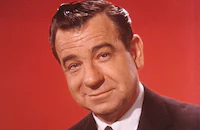The Secret Life of an American Wife
Brief Synopsis
Cast & Crew
George Axelrod
Walter Matthau
Anne Jackson
Patrick O'neal
Edy Williams
Richard Bull
Film Details
Technical Specs

Synopsis
Victoria Layton, a suburban housewife devoted to her husband Tom, a harried public relations man, resents his statement that she could never have been a successful call girl. Exaggerated recollections of past sexual adventures serve further to convince her that life is passing her by. After bolstering her courage with several brandies Victoria calls her husband's biggest client, movie star "Charlie," and sets up a date with him as a $100 call girl. Instead of a mad sexual fling in Charlie's New York hotel suite, however, Victoria finds herself nursing his sinus attack. At first upset that the screen's famed lover finds her no more desirable than does her husband, Victoria is somewhat assuaged when Charlie confesses that his prowess as a lover is based on press releases. After exchanging confidences and discovering that they are compatible, Victoria and Charlie eventually make love; but their idyll is shattered when Tom telephones from the lobby and announces that he is on his way up. While Victoria hides in the bedroom, Tom storms in, tells off Charlie, threatens to quit as his press agent, and punches Charlie in the nose. After ministering to Charlie's wounds, Victoria returns home. As she leaves, Charlie slips her a $100 bill for cab fare.

Director

George Axelrod
Cast

Walter Matthau
Anne Jackson

Patrick O'neal
Edy Williams
Richard Bull
Paul Napier
Gary Brown
Albert Carrier
Todd Baron
Christy Hall
Crew
L. B. Abbott
Cleo Anton
George Axelrod
George Axelrod
Raphael Bretton
Art Cruickshank
David Dockendorf
William Eckhardt
Bernard Freericks
Harry Gerstad
Ed Graves
Sydney Guilaroff
Edith Lindon
Billy May
Hank Moonjean
Hank Moonjean
Walter M. Scott
Leon Shamroy
Jack Martin Smith
Dan Striepeke
Travilla

Film Details
Technical Specs

Articles
George Axelrod, 1922-2003
Born June 9, 1922, in New York City to the son of the silent film actress Betty Carpenter, he had an eventful childhood in New York where, despite little formal education, he became an avaricious reader who hung around Broadway theaters. During World War II he served in the Army Signal Corps, then returned to New York, where in the late 40's and early 50's he wrote for radio and television and published a critically praised novel, Beggar's Choice.
He scored big on Broadway in 1952 with The Seven Year Itch. The comedy, about a frustrated, middle-aged man who takes advantage of his family's absence over a sweltering New York summer to have an affair with a sexy neighbor, won a Tony Award for its star, Tom Ewell, and was considered daring for its time as it teased current sexual mores and conventions. The play was adapted into a movie in 1955 by Billy Wilder, as a vehicle for Marilyn Monroe, with Ewell reprising his role. Unfortunately, the censors and studio executives would not allow the hero to actually consummate the affair; instead, Ewell was seen merely daydreaming a few romantic scenes, a situation that left the playwright far from happy.
Nevertheless, the success of The Seven Year Itch, opened the door for Axelrod as a screenwriter. He did a fine adaptation of William Inge's play Bus Stop (1956) again starring Marilyn Monroe, and did a splendid job transferring Truman Capote's lovely Breakfast at Tiffany's (1961). Although his relationship with the director Blake Edwards was rancorous at best, it did earn Axelrod his only Academy Award nomination.
So frustrated with his work being so heavily revised by Hollywood, that Axelrod decided to move from New York to Los Angeles, where he could more closely monitor the treatment of his scripts. It was around this period that Axelrod developed some his best work since he began producing as well as writing: the incisive, scorchingly subversive cold war thriller The Manchurian Candidate (1962), based on Richard Condon's novel about an American POW (Laurence Harvey) who returns home and is brainwashed to kill a powerful politician; the urbane comedy Paris When it Sizzles (1964) that showed off its stars William Holden and Audrey Hepburn at their sophisticated best; his directorial debut with the remarkable (if somewhat undisciplined) satire Lord Love a Duck (1966) that skewers many sacred institutions of American culture (marriage, school, wealth, stardom) and has since become a cult favorite for midnight movie lovers; and finally (his only other directorial effort) a gentle comedy of wish fulfillment The Secret Life of an American Wife (1968) that gave Walter Matthau one of his most sympathetic roles.
By the '70s, Axelrod retired quietly in Los Angeles. He returned to write one fine screenplay, John Mackenzie's slick political thriller The Fourth Protocol (1987) starring Michael Caine. He is survived by his sons Peter, Steven, and Jonathan; a daughter Nina; seven grandchildren; and a sister, Connie Burdick.
by Michael T. Toole

George Axelrod, 1922-2003
Quotes
Trivia
Notes
Location scenes filmed in Manhattan and New Canaan, Connecticut.

Miscellaneous Notes
Released in United States Summer August 1968
Released in United States Summer August 1968













